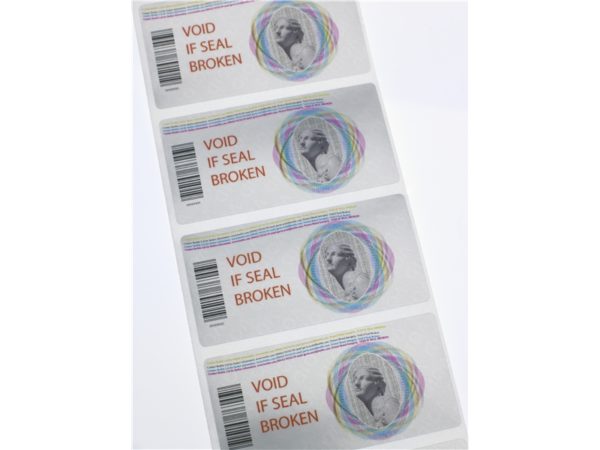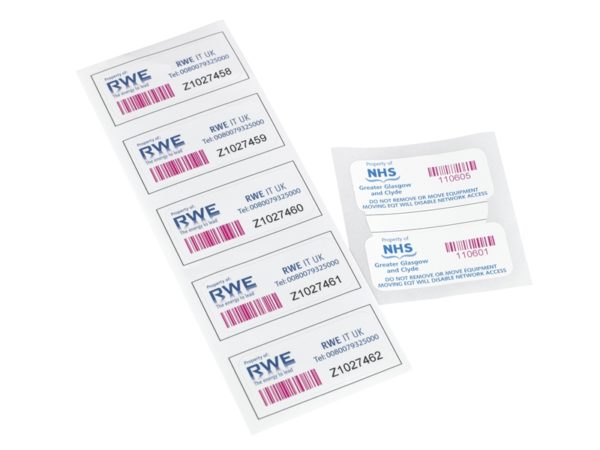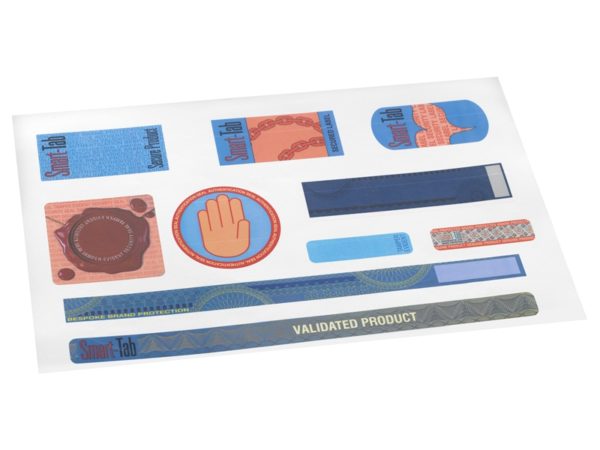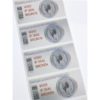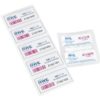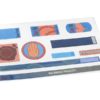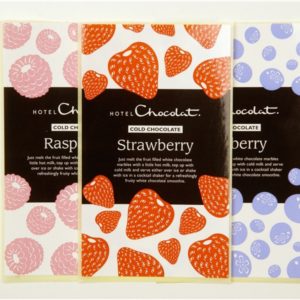Digital VOID Labels
Home / Full Product Range / Digital Labels / Digital VOID Labels
VOID labels are a special type of security label. Used extensively in asset labelling and brand counterfeit protection, they feature a strong adhesive. If an attempt is made to remove the label it will leave the word VOID permanently marked on the product.
Previously the only methods of printing were expensive, such as foil or flexographic printing. Labelservice can now offer fully digitally printed VOID labels, in both white and silver materials. We can produce full colour imagery, as well as sequential numbering and barcdoing. We can also offer inline finishing such as matt or gloss varnishing and laminations.
Contact us today for for more information or samples.
Void Labels FAQs
Void labels, also known as warranty void stickers, are a type of security label commonly used in various industries, including asset labelling and brand counterfeit protection. These labels feature a strong adhesive that bonds securely to products. What sets them apart is their unique security feature: if anyone attempts to remove the label, it leaves behind a clear and permanent “VOID” mark on the product’s surface.
At Labelservice, we offer a comprehensive range of void labels, including fully digitally printed options in both white and silver materials.
When individuals attempt to remove these labels from a product, they initiate a distinctive response, signifying potential tampering.
Three primary types of void labels exist:
Total Transfer: This variant leaves an additional layer with a release coating on the product’s surface when someone endeavours to peel off the label, revealing a distinct “VOID” message.
Non-Transfer: Non-transfer void labels can be detached from the product, but they leave a “VOID” message on either the label or the product’s surface to indicate tampering.
Partial Transfer: The most prevalent type, partial transfer void labels, utilise a pattern release coating or adhesive. When the label is removed, a portion of the additional layer adheres to the face material, and a portion sticks to the adhesive, generating a “VOID” message on both the substrate and the label’s rear.
The top six products we print void labels for are electrical devices, computers, appliances, pharmaceuticals, luxury goods and industrial equipment.
Electronic Devices: In the world of consumer electronics, such as smartphones, tablets, and gaming consoles, warranty void stickers are used to secure access points and deter unauthorised opening or tampering. This ensures that only authorised service providers can access and repair the device without voiding the warranty.
Computer Hardware: Components like laptops, desktops, and servers often feature warranty void stickers. These stickers help manufacturers identify whether users have attempted to open or modify the hardware, which can affect warranty coverage.
Appliances: Household appliances, such as refrigerators, washing machines, and dishwashers, may have warranty void stickers to discourage unauthorised repair or tampering. This maintains product reliability and warranty validity.
Pharmaceuticals: In the pharmaceutical industry, warranty void stickers are used on medicine packaging to indicate if the packaging has been tampered with. This is critical for ensuring the safety and effectiveness of the medication.
High-Value Merchandise: Luxury goods, high-end watches, and valuable collectibles often incorporate warranty void stickers. These labels help maintain the authenticity and value of the product, discouraging any attempts at tampering or counterfeiting.
Sensitive Equipment: Industrial and scientific equipment, for example laboratory equipment, CNC and MRI machines, which can be both costly and critical for various processes, often include warranty void stickers. These labels act as a protective measure against unauthorised adjustments or tampering, ensuring the equipment’s reliability.
Warranty void stickers are typically crafted from durable polyester material, known for its strength and resistance to wear and tear.
They use a permanent adhesive making it challenging to remove without triggering the “VOID” message.
Warranty void stickers provide customization choices, such as incorporating logos, text, colours, shapes, barcodes, sequential numbering, and tamper-evident patterns.
Warranty void stickers are generally considered legal in the UK, but their use is subject to specific regulations. Businesses must adhere to consumer protection laws and fair trading practices when employing these stickers. They should not unduly restrict consumer rights, particularly those outlined in the Consumer Rights Act 2015.
In the UK, it is vital that warranty void stickers:
- Do not mislead consumers regarding their statutory rights.
- Do not hinder consumers from pursuing legitimate warranty claims or refunds.
- Avoid imposing unfair terms or conditions that contravene consumer protection regulations.
Two two most common methods are using alcohol and peanut butter. Alcohol helps to dissolve the residue, whilst the natural oils in peanut better help break down the adhesive.
VOID labels are a special type of security label. Used extensively in asset labelling and brand counterfeit protection, they feature a strong adhesive. If an attempt is made to remove the label it will leave the word VOID permanently marked on the product.
Previously the only methods of printing were expensive, such as foil or flexographic printing. Labelservice can now offer fully digitally printed VOID labels, in both white and silver materials. We can produce full colour imagery, as well as sequential numbering and barcdoing. We can also offer inline finishing such as matt or gloss varnishing and laminations.
Contact us today for for more information or samples.
Void Labels FAQs
Void labels, also known as warranty void stickers, are a type of security label commonly used in various industries, including asset labelling and brand counterfeit protection. These labels feature a strong adhesive that bonds securely to products. What sets them apart is their unique security feature: if anyone attempts to remove the label, it leaves behind a clear and permanent “VOID” mark on the product’s surface.
At Labelservice, we offer a comprehensive range of void labels, including fully digitally printed options in both white and silver materials.
When individuals attempt to remove these labels from a product, they initiate a distinctive response, signifying potential tampering.
Three primary types of void labels exist:
Total Transfer: This variant leaves an additional layer with a release coating on the product’s surface when someone endeavours to peel off the label, revealing a distinct “VOID” message.
Non-Transfer: Non-transfer void labels can be detached from the product, but they leave a “VOID” message on either the label or the product’s surface to indicate tampering.
Partial Transfer: The most prevalent type, partial transfer void labels, utilise a pattern release coating or adhesive. When the label is removed, a portion of the additional layer adheres to the face material, and a portion sticks to the adhesive, generating a “VOID” message on both the substrate and the label’s rear.
The top six products we print void labels for are electrical devices, computers, appliances, pharmaceuticals, luxury goods and industrial equipment.
Electronic Devices: In the world of consumer electronics, such as smartphones, tablets, and gaming consoles, warranty void stickers are used to secure access points and deter unauthorised opening or tampering. This ensures that only authorised service providers can access and repair the device without voiding the warranty.
Computer Hardware: Components like laptops, desktops, and servers often feature warranty void stickers. These stickers help manufacturers identify whether users have attempted to open or modify the hardware, which can affect warranty coverage.
Appliances: Household appliances, such as refrigerators, washing machines, and dishwashers, may have warranty void stickers to discourage unauthorised repair or tampering. This maintains product reliability and warranty validity.
Pharmaceuticals: In the pharmaceutical industry, warranty void stickers are used on medicine packaging to indicate if the packaging has been tampered with. This is critical for ensuring the safety and effectiveness of the medication.
High-Value Merchandise: Luxury goods, high-end watches, and valuable collectibles often incorporate warranty void stickers. These labels help maintain the authenticity and value of the product, discouraging any attempts at tampering or counterfeiting.
Sensitive Equipment: Industrial and scientific equipment, for example laboratory equipment, CNC and MRI machines, which can be both costly and critical for various processes, often include warranty void stickers. These labels act as a protective measure against unauthorised adjustments or tampering, ensuring the equipment’s reliability.
Warranty void stickers are typically crafted from durable polyester material, known for its strength and resistance to wear and tear.
They use a permanent adhesive making it challenging to remove without triggering the “VOID” message.
Warranty void stickers provide customization choices, such as incorporating logos, text, colours, shapes, barcodes, sequential numbering, and tamper-evident patterns.
Warranty void stickers are generally considered legal in the UK, but their use is subject to specific regulations. Businesses must adhere to consumer protection laws and fair trading practices when employing these stickers. They should not unduly restrict consumer rights, particularly those outlined in the Consumer Rights Act 2015.
In the UK, it is vital that warranty void stickers:
- Do not mislead consumers regarding their statutory rights.
- Do not hinder consumers from pursuing legitimate warranty claims or refunds.
- Avoid imposing unfair terms or conditions that contravene consumer protection regulations.
Two two most common methods are using alcohol and peanut butter. Alcohol helps to dissolve the residue, whilst the natural oils in peanut better help break down the adhesive.


